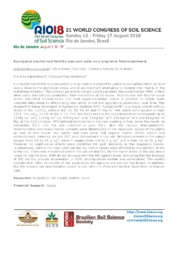Eucalyptus biochar soil fertility and corn yield on a long term field experiment.
Eucalyptus biochar soil fertility and corn yield on a long term field experiment.
Author(s): LUCON, I. M.; COSCIONE, A. R.; ANDRADE, C. A. de
Summary: Eucalyptus wood char is a renewable energy source produced by partial wood carbonization on mud ovens close to the plantation areas, and is an important alternative to mineral char mainly in the metallurgy industry. This process generates a black solid by-product, the wood biochar (WB), collect after many char batches production, form the bottom of the ovens. Most studies with biochar occur under controlled environments. The field experimentation makes it possible to obtain more concrete data about its effects long term either in soil and agricultural production, over time. This research is being developed at Agronomic Institute (IAC), Campinas/SP, in a clayey oxisoil with six doses of WB: Control, without WB; 10, 20, 30, 40 and 50 Mg ha-1 WB, which were applied on April 2016. The pHH2O (1:10) of WB is 7.5. The WB doses used in the experimentation corresponds up to 25 Mg ha-1 of C; 1.4 Mg ha-1 Ca; 470 kg ha-1 of N; 75 kg ha-1 of P; 320 kg ha-1 of K and 65 kg ha-1 of Mg, at the 0-20 cm layer. NPK fertilization occurred in the corn planting, in line, below the seeds, on December 2017. The soil was collected in June 2017, after the harvest. Macronutrients, micronutrients and heavy metals contents were determinate in the diagnostic leaves of the plants as well as the shoots dry matter and corn yield. Soil organic matter (SOM), macro and micronutrients contents, pH and CEC were determinate in the soil. Nitrogen contents in the plants ranged from 28 to 30 g kg-1; while P ranged from 1.8 to 2 g kg-1 and K from 19 to 20 g kg-1. However no significative effects were identified for such elements in the diagnostic leaves. Furthermore, neither the corm yield nor the dry matter shoots were affected by the addition of WB to the soil. There was a small increase in the soil pH and CEC for the higher doses of WB, but also it were not significative. SOM did not increase with the WB applied doses, indicating that the increase of WB did not provide acceleration in SOM decomposition neither was mineralized. The results indicate that, after 14 months of soil application, WB aging in soil was not significant. In addition, the WB showed low neutralization power in soil, which is often with biochar application in tropical soils.
Publication year: 2018
Types of publication: Abstract in annals or event proceedings
Unit: Embrapa Environment
Keywords: By-product, Eucalipto, Fertilidade do Solo, Milho, Oxisol, soil organic matter
Observation
Some of Embrapa's publications are published as ePub files. To read them, use or download one of the following free software options to your computer or mobile device. Android: Google Play Books; IOS: iBooks; Windows and Linux: Calibre.
Access other publications
Access the Agricultural Research Database (BDPA) to consult Embrapa's full library collection and records.
Visit Embrapa Bookstore to purchase books and other publications sold by Embrapa.

